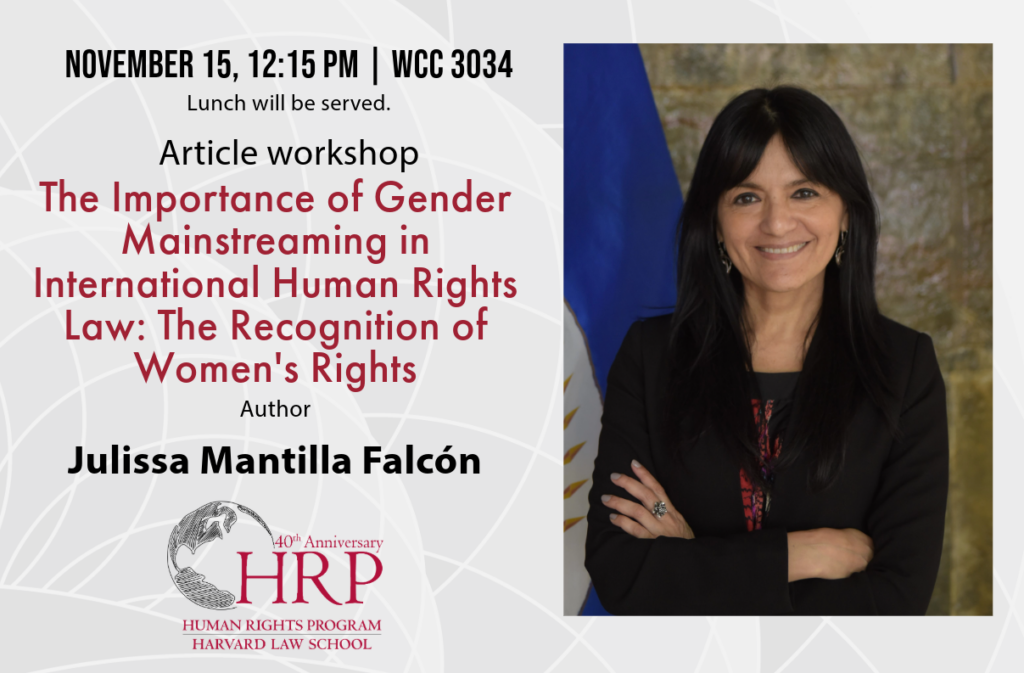

Join Julissa Mantilla Falcón, former member and president of the Inter-American Commission on Human Rights, at Harvard Law School on November 15 for a workshop hosted by HRP on her article “The Importance of Gender Mainstreaming in International Human Rights Law: The Recognition of Women’s Rights“. Harvard Law School S.J.D. student Vanessa Daza Castillo will provide a response to the article presentation, while Mariela Noles Cotito will moderate.
Those interested in participating should email [email protected] to RSVP and obtain a digital copy of the study from the SSRN website. Participants will be expected to have read the work and come prepared to offer constructive comments. As this is a work in progress, please do not distribute outside of this group.
Article abstract
Although the doctrine and jurisprudence of International Human Rights Law (IHRL) currently recognize the importance of women’s rights and the gender perspective, the truth is that from the beginning, IHRL was conceived from an perspective that privileged the male experience , both when identifying human rights violations and when investigating and litigating them.
Thus, the particular situation and experience of women -mainly linked to the private sphere and the assignment of traditional gender roles- was not included. Thus, femicides, domestic violence and sexual violence, among other acts, were not identified as human rights violations and were not criminalized in domestic law. For example, marital rape was only recognized as a crime in the Peruvian Penal Code of 1991 and at it was only in the 1990s that it was recognized as an international crime, that is, as a crime against humanity and/or war crime.
In this sense, this article reviews the general foundations of IHRL and analyzes them in the light of the gender approach, so that a legal proposal can be constructed that can be applied to those human rights violations that specifically affect women and that have been traditionally invisibilized, as well as including women in a differentiated manner in the general study of human rights violations.
Therefore, the first part of the text will provide a general review of IHRL, analyzing the impact of androcentrism on it, including examples of how the situation of women has been made invisible. Subsequently, we will review the main foundations for the incorporation of the gender approach in the IHRL, and finally focus on the case of enforced disappearances and sexual violence against women in armed conflicts.
Speaker bios:
A former member and president of the Inter-American Commission on Human Rights, Julissa Mantilla Falcón specializes in human rights and has a degree from the Pontifical Catholic University of Peru (PUCP), a diploma in Gender from the PUCP, and an LLM in International Human Rights Law from the London School of Economics and Political Science (LSE) at the University of London. She worked in the Peruvian Ombudspersons Office and was in charge of gender issues in the Commission for Truth and Reconciliation in Peru. She has served as an international consultant on transitional justice for UN Women. She is a professor at the Law School and the master’s degree in Human Rights at the PUCP and at the Academy on Human Rights and Humanitarian Law at the American University’s Washington College of Law. She has lectured internationally and authored several academic publications.
Vanessa Daza Castillo (respondent) has been a S.J.D. student at Harvard Law School since 2022. Prior to that, she obtained her LL.M. in 2021 and was a Visiting Researcher at HLS in 2021-2022. Her dissertation topic is on “Gender, the Economic Household, and Social Movement Strategy in Two Colombian Environmental Conflicts: Studies in Law and Feminist Political Ecology”. Vanessa’s research interests include law and development, feminist geography, critical legal studies, human rights and constitutional law. Past stations have included the Center for International Environmental Law, Dejusticia and International Women’s Rights Action Watch. Vanessa is a cofounder of the Colombian feminist digital activism collective SietePolas and received her J.D. from Universidad de los Andes in Colombia.
Mariela Noles Cotito (moderator) is a 2024-25 Custer Visiting Scholar at the David Rockefeller Center for Latin American Studies at Harvard University and a Professor of Discrimination and Public Policy at the Universidad del Pacífico in Lima, Peru. Her research portfolio spans areas such as gender equality, social inclusion policies, and the intersections of various systems of oppression shedding light on how they place different segments of society beyond the protective ambit of the law. In her current research endeavors, she is exploring the efficacy of ethno-racial legislation in promoting and safeguarding the rights of Afro-descendants in Peru. Her approach to research and scholarship combines legal expertise with a policy-focused analysis and insights from the social sciences.
